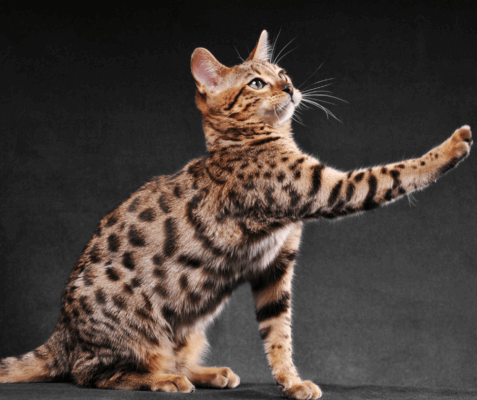Bengal cats are growing in popularity as pets that cause fewer allergic reactions. While no cat is 100% non-allergenic, Bengals tend to bother allergy sufferers less than other breeds. Their unique origins and characteristics make Bengal cats one of the more hypoallergenic options for cat lovers.
History of Bengal Cats
Bengal cats originated from crossing small Asian Leopard Cats with domestic cats. The goal was to breed cats with a wild appearance but a domestic temperament.
Origins in the 1960s
Jean Sugden Mill began breeding Asian Leopard cats with domestic cats in 1963. She was working with geneticists at Loyola University Medical Center to develop an animal model for leukaemia research. When Mill moved to California in 1975, she began deliberately breeding leopard cat hybrids as pets.

Increased Popularity in the 1980s
In the early 1980s, Bengal cats started to gain attention from cat breeders and fanciers. Their attractive coats appealed to people looking for unusual pets. More breeders began working with Bengals, improving health and temperament. The International Cat Association accepted Bengal cats as a new breed in 1991.
Growing Popularity Today
Bengals remain one of the most sought-after pedigreed cats today. Their energetic and affectionate personality appeals to many cat lovers. Their wildcat origins and markings continue to make them stand out. For those with allergies, Bengals offer the chance to enjoy having a cat with fewer allergy problems.
Why Bengal Cats Are Less Allergenic
While no cat is truly hypoallergenic, several factors make Bengal cats less irritating for those with allergies.
Fur Characteristics
Bengals have a short, fine coat that lies close to their body. Their fur tends to trap less dander and saliva. With fewer of these allergens circulating in the air, Bengal cats provoke fewer allergic reactions. Their hair also does not mat or tangle easily, requiring less grooming overall.
Saliva Differences
Early generation Bengal cats tend to produce less of the Fel-D1 protein in their saliva. This is a common allergen in other cats. While saliva production increases in later generations, it remains lower than many domestic cat breeds. Less saliva means fewer airborne allergens.
Active Personalities
Bengals are extremely active cats that love to play and climb. They spend less time curled up and shedding on furniture. Their energetic nature means they spread around less dander in the home. An active Bengal is also likely to groom itself more frequently, removing allergens trapped in its fur.

Less Shedding
In addition to everything else, Bengal cats are moderate rather than heavy shedders. They lose less fur overall, so less hair and dander are circulating indoors. Many cat lovers appreciate the lower maintenance grooming needs of the Bengal.
Tips for Allergy Sufferers
While no pet is non-allergenic, there are steps allergy sufferers can take to live comfortably with a Bengal cat.
Seek Out Early Generations
Opt for an F1, F2, or F3 Bengal from a reputable breeder. These earlier generations tend to produce fewer allergens than cats further down the breeding line. Look for paperwork documenting filial generations.
Bathe Regularly
Bathing your Bengals once a week can significantly reduce dander and saliva buildup on their coat. Be sure to use a cat-safe shampoo recommended by your vet. Regular brushing between baths also helps remove allergens.
Use an Air Purifier
Invest in a quality HEPA air purifier for your home. This will continuously filter out dander and other allergens. Replace filters regularly per manufacturer recommendations. Cleaners work best when you run them always.
Vacuum Frequently
Use a vacuum with a HEPA filter to effectively remove allergens from surfaces in your home. Pay special attention to carpets, furniture, window treatments, and cat bedding.
Limit Access
If allergies are severe, limit your Bengal’s access to bedrooms and other sensitive areas. Keeping them out of high-traffic areas can reduce airborne allergens. You may also want to rehome fabrics like rugs and curtains in favour of easily cleaned hard surfaces.
Bengal cats can be an excellent choice for allergy sufferers seeking feline companionship. Their energetic personality continues to make them popular among cat lovers. Even those with allergies can enjoy life with these active, affectionate cats with a few precautions.

